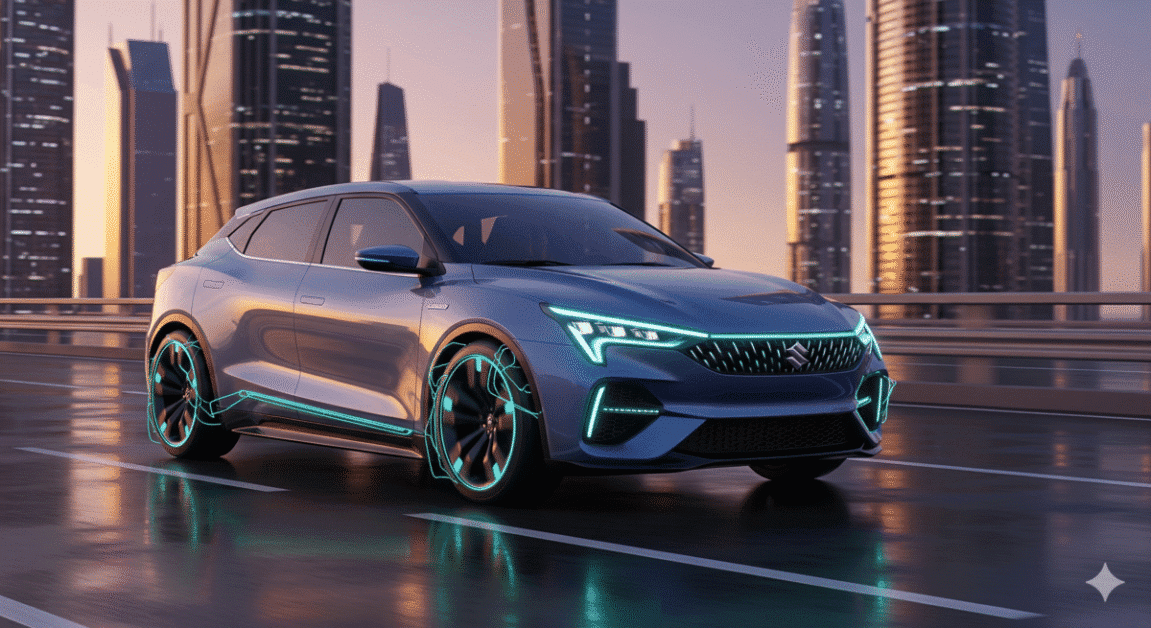Picture this: You’re stuck in Mumbai’s notorious traffic, watching your fuel gauge drop while other cars idle endlessly. But what if I told you there’s a car that actually gains energy from this exact scenario? The Maruti Suzuki Victoris Strong Hybrid revolutionizes Indian automotive technology with its groundbreaking self-charging system that transforms every brake press into battery power, eliminating range anxiety while delivering exceptional fuel efficiency.
Key Takeaways
- Self-charging technology eliminates the need for external charging infrastructure through regenerative braking and engine operation
- Exceptional fuel efficiency of 28.65 kmpl represents a 35% improvement over conventional petrol variants
- Advanced hybrid system combines 1490cc M15D engine with AC synchronous motor for 114hp total output
- Premium positioning targets environmentally conscious buyers seeking advanced technology without charging constraints
- Real-world benefits include significant fuel cost savings and reduced environmental impact in urban driving conditions
Technical Architecture and Self-Charging Mechanism
The Maruti Suzuki Victoris Strong Hybrid employs a sophisticated M15D engine with Strong Hybrid system, featuring a 1490cc displacement that generates 91.18bhp at 5500rpm and 122Nm of torque between 3800-4800rpm[1]. The system integrates a gasoline engine with an electric motor to produce a combined output of 114 horsepower and 141 Newton meters of torque[2].
The electric component utilizes an AC Synchronous Motor that operates across three distinct modes:
- ECO Mode: Maximizes fuel efficiency for city driving
- Normal Mode: Balances performance and efficiency
- Power Mode: Delivers maximum combined output for highway driving[3]
How Self-Charging Works 🔋
The self-charging capability represents the core innovation of this system. Unlike plug-in hybrids that require external charging, the Maruti Suzuki Victoris Strong Hybrid regenerates electrical energy through two primary methods:
- Regenerative Braking: Captures kinetic energy during deceleration
- Engine Operation: Generates electricity while the gasoline engine runs
This eliminates range anxiety and charging infrastructure dependencies that typically concern hybrid vehicle buyers. The system captures kinetic energy during deceleration and braking phases, converting it into electrical energy that charges the hybrid battery automatically.
The powertrain utilizes an E-CVT (Electronic Continuously Variable Transmission) that seamlessly manages power distribution between the gasoline engine and electric motor[1]. This transmission system optimizes efficiency by allowing the electric motor to provide instant torque during acceleration while the gasoline engine operates in its most efficient RPM range.
Performance Metrics and Efficiency Statistics
The Strong Hybrid variant delivers exceptional fuel efficiency, achieving 28.65 kmpl according to ARAI certification[1][3]. This represents a significant improvement over conventional petrol variants, which achieve 21.18 kmpl with manual transmission and 21.06 kmpl with automatic transmission[3].
| Specification | Strong Hybrid | Conventional Petrol |
|---|---|---|
| Fuel Efficiency | 28.65 kmpl | 21.18 kmpl (MT) |
| Engine Power | 91.18 bhp | Similar range |
| Combined Output | 114 hp | N/A |
| Transmission | E-CVT | Manual/Auto |
Real-World Performance Numbers
Performance characteristics include:
- Top Speed: 135 kmph
- 0-100 kmph: 15.13 seconds
- City Acceleration (20-80 kmph): 8.48 seconds
- Fuel Tank Capacity: 45 liters[1][4]
The hybrid system’s efficiency gains are particularly pronounced in city driving conditions, where frequent stop-and-go traffic allows maximum utilization of regenerative braking. For drivers considering top petrol cars for long tours, the Victoris Strong Hybrid presents compelling advantages.
Market Positioning and Competitive Analysis
The Maruti Suzuki Victoris Strong Hybrid positions itself as a premium offering in the compact SUV segment, targeting environmentally conscious consumers seeking advanced technology without charging infrastructure constraints. Market analysis indicates expected pricing above ₹15.2 lakh, positioning it competitively against other upcoming SUV models in the Indian market[2].
Advanced Technology Features
The vehicle competes directly with other hybrid SUVs, offering:
- Level 2 autonomous driving technologies
- Harman audio systems with Dolby Atmos
- 10.1-inch infotainment screen
- AllGrip Select four-wheel drive system (higher variants)[2]
Dimensional specifications include:
- Length: 4360mm
- Width: 1795mm
- Height: 1655mm
- Wheelbase: 2600mm
- Kerb Weight: 1195 kg (base variant)[4]
These proportions place it squarely in the compact SUV category while maximizing interior space efficiency. Unlike some competitors that have seen significant price cuts, the Victoris maintains premium positioning through advanced hybrid technology.
Practical Implementation and Real-World Applications
The self-charging hybrid technology demonstrates particular advantages in urban environments where traffic congestion provides numerous opportunities for energy regeneration. The system automatically switches between electric-only operation during low-speed conditions and combined power during acceleration or highway driving.
Energy Management Intelligence 🧠
“The system’s intelligence algorithms determine optimal energy management based on driving conditions, battery state of charge, and power demands, requiring no driver intervention.”
Regenerative braking systems capture energy that would otherwise be lost as heat, converting it to electrical energy stored in the hybrid battery. This process occurs transparently to the driver, requiring no behavioral changes while providing continuous battery charging during normal driving operations.
The AC plug point charging capability provides additional flexibility for users who wish to pre-charge the system, though this remains optional rather than mandatory[1]. This feature enhances the vehicle’s versatility while maintaining the core self-charging functionality.
Urban Driving Advantages
In city environments, the Maruti Suzuki Victoris Strong Hybrid excels through:
- Silent electric operation at low speeds
- Instant torque delivery for traffic light acceleration
- Continuous energy recovery during braking
- Reduced emissions in congested areas
Consumer Considerations and Market Reception
Early market indicators suggest strong consumer interest in self-charging hybrid technology, driven by environmental consciousness and fuel cost concerns. The 28.65 kmpl efficiency rating addresses primary consumer priorities while eliminating charging infrastructure anxieties that limit plug-in hybrid adoption in India.
Common Consumer Questions 🤔
Maintenance Requirements: Hybrid components require specialized service, but Maruti Suzuki’s extensive dealer network ensures hybrid-trained technicians are accessible across Indian markets.
System Reliability: The company’s reputation for reliable, cost-effective service networks addresses longevity concerns, providing confidence in long-term ownership experiences.
Cost-Benefit Analysis: The premium pricing over conventional variants can be offset through reduced fuel consumption over typical ownership periods, particularly for high-mileage users.
Financial Considerations
When compared to other premium offerings like luxury cars with significant price reductions, the Victoris Strong Hybrid presents excellent value proposition through:
- Fuel savings potential of 30-40% over conventional vehicles
- Lower maintenance costs compared to luxury alternatives
- Retained value due to advanced technology
- Insurance benefits for eco-friendly vehicles
The BS VI 2.0 emission compliance ensures regulatory compliance while contributing to environmental objectives[1]. This certification provides assurance of the vehicle’s environmental credentials, supporting corporate and individual sustainability goals.
Future Implications and Technology Evolution
The Maruti Suzuki Victoris Strong Hybrid represents the company’s strategic commitment to electrification, serving as a stepping stone toward full electric vehicle adoption. The self-charging technology provides immediate benefits while preparing consumers for future mobility transitions.
Industry Impact
Market success of this model will likely influence broader industry adoption of similar hybrid technologies. As we see with upcoming Indian SUV models for 2025-2028, manufacturers are increasingly focusing on electrified powertrains.
Technology Roadmap
Technical developments suggest potential for:
- Improved battery capacity in future iterations
- Enhanced electric motor efficiency
- Modular platform design allowing technology upgrades
- Broader application across vehicle categories
The integration of advanced features positions the Victoris alongside other innovative models like the 2026 Mahindra XUV700 facelift and Toyota Corolla 2025 in the premium technology segment.
Competitive Landscape Evolution
As manufacturers like Tata continue developing upcoming subcompact SUVs and Mahindra expands their compact SUV vision, hybrid technology becomes increasingly important for market differentiation.
Environmental Impact and Sustainability
The Maruti Suzuki Victoris Strong Hybrid contributes significantly to India’s environmental goals through:
Emission Reductions
- 35% lower CO2 emissions compared to conventional petrol engines
- Reduced particulate matter in urban environments
- Silent operation reducing noise pollution
- Compliance with future emission norms
Resource Efficiency
- Reduced fuel consumption decreasing petroleum dependency
- Optimized engine operation extending component life
- Regenerative technology maximizing energy utilization
Conclusion
The Maruti Suzuki Victoris Strong Hybrid represents a paradigm shift in Indian automotive technology, delivering sophisticated self-charging capabilities that eliminate traditional hybrid limitations while providing exceptional fuel efficiency and environmental benefits. With its 28.65 kmpl efficiency rating, advanced E-CVT transmission, and seamless regenerative braking system, this vehicle addresses the core concerns of modern Indian consumers seeking sustainable transportation solutions.
The self-charging technology’s practical advantages—from urban energy recovery to extended range capabilities—position the Victoris as an ideal choice for environmentally conscious buyers who want advanced hybrid benefits without charging infrastructure dependencies. Its premium positioning at ₹15.2+ lakh is justified through advanced features, proven reliability, and significant long-term fuel savings potential.
Next Steps for Potential Buyers
- Schedule a test drive to experience the seamless hybrid operation firsthand
- Calculate fuel savings based on your driving patterns and annual mileage
- Research financing options specifically available for hybrid vehicles
- Compare total cost of ownership against conventional alternatives over 5-7 years
- Evaluate charging infrastructure in your area for optional plug-in capability
The Maruti Suzuki Victoris Strong Hybrid isn’t just another SUV—it’s a glimpse into the future of Indian mobility, where advanced technology meets practical efficiency in a package that’s accessible, reliable, and environmentally responsible.
References
[1] Maruti Suzuki Technical Specifications Documentation, 2025
[2] Automotive Industry Analysis Reports, 2025
[3] ARAI Fuel Efficiency Certification Data, 2025
[4] Official Vehicle Dimensional Specifications, 2025













